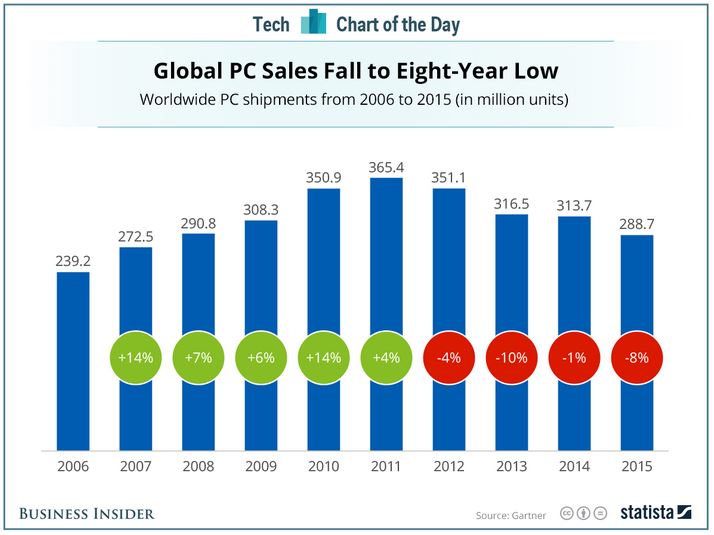Remember the time when Steve Jobs first introduced the revolutionary multi-touch enabled iPhone during a MacWorld even in 2007? Well, here is the catch: worldwide sales of PCs have fallen drastically in Q4 2015 to the lowest point since 2007—the year iPhone was launched. Now, not only the iPhone, but also economic issues like falling commodity prices and weak international currencies, as well as disruptions in EMEA and APAC markets that in turn affected the foreign market were key factors contributing to a historical decline in 2015, says IDC. The research firm in a preliminary report, suggests that worldwide PC shipments summed up to 71.9 million units in the Q4 2015, along with a Year-on-Year decline of -10.6%. Their rival Gartner, however, suggests in a preliminary report that the worldwide PC shipments totaled 75.7 million units in the Q4 2015, along with an 8.3% decline from Q4 2014. The PC shipments figures in Q4 2015 differ slightly but both the research firms have zeroed-in on one fact – Worldwide PC market is witnessing a significant decline.
But, all such disappointing figures and trends also carry an interesting fact; Despite such market shift, there is a PC manufacturer that has been strengthening its presence in PC market. The only vendor that posted a consistent growth was—well you guessed it right-Apple! According to IDC, Apple registered a 2.8% Year-on-Year growth (4Q15/4Q14) in Mac PC shipment, along with a 1.1% point hike in its market share.
Even though most of the big vendors posted negative Y-o-Y growth in Q4 2015, Apple, ASUS and Lenovo performed fairly well. Compared to the overall PC shipments market that declined 10.6%, Lenovo managed to restrict the declining rate to just 4.5% but strengthened its market share to 21.4% from 20% in the year-ago quarter. ASUS posted a flat growth of 0.8%, outperforming the market to move into the 4th position. ASUS sold roughly 6 million units along with a 7.9% market share; this was the best quarter for the company since 2012 as they witnessed strong sales in the troubled APAC market. But it was Apple that surprised everyone. The Mac maker not only went against the tide but also closed the quarter with 7.9% market share, a 1.1% point increase in its market share in the year-ago quarter.
Statista’s global PC sales graph (below) shows that the PC industry peaked at 365.4 million units in 2011—this was after the launch of iPad and Galaxy Tab in 2010. In fact, in 2010, the global PC industry posted a 14% growth in shipments. The industry then followed a declining trends after 2011; but in 2014, with the rise of several matured tablets, and tablet convertibles including the Surface Pro 3, and HP’s first 64-bit Windows 8.1 convertible tablet, and several other 2-in-1 devices, the PC industry dipped only by -1%. Concurrently, Microsoft ended support for Windows XP in 2014, which also pushed the sales of their newer generation devices carrying Windows 8 and above.
Can Windows 10 Save The PC Industry?
Interestingly, the share of larger screen (>10″) tablets and 2-in-1’s is expected to grow from 18.6% in 2014 to 39.5% in 2019—all the 2-in-1 and convertible tablet ranges fall in this category. Apparently, the future of PC industry could lie in the mercy of hybrid tablets as a report points out that the future of e-commerce lies with mobile—the tablet conversion rate has shown a consistent growth of 2.86% in Q2 2015 to 3.22% in Q2 2015. Similarly, when zooming into the global market share of HP which manufactures the whole lot of hybrid tablets (running windows 10), it is evident that the company has posted a consistent growth since Q2 2015. Devices running Windows 10 OS have also helped spike overall shipments for other similar vendors like Lenovo, Dell and ASUS.
Does this mean that Windows 10 could help solve the plummeting PC sales? Maybe!
Microsoft has seen the opening presented in front of them, and with the launch of Windows 10 and similar platforms, the digital industry is embracing a shift towards ‘mobile ecosystems’. Microsoft has made the first major step to make this happen—they have officially ended support for 8, as well as support for older versions of its Internet explorer browser, IE 8, IE 9, and IE 10. Although Windows 7 still the widely used OS, with the rise of an ecosystem trend that aims to bring all your similar devices under one roof, the global PC market could sigh a relief next year. For example, Apple’s iOS 9 update achieved a record adoption rate of 75%–this led to iOS9 being installed in 66% of all compatible devices; Windows 10 continuum update that allows the OS to work better with devices that support a mouse, keyboard and touch input, like Microsoft’s Surface Tablet or Lenovo’s Yoga laptops. The continuum feature even allows the latest Lumia 950 to be converted into a PC. Well, Microsoft has truly understood the importance of ecosystems here. But will Android follow?


